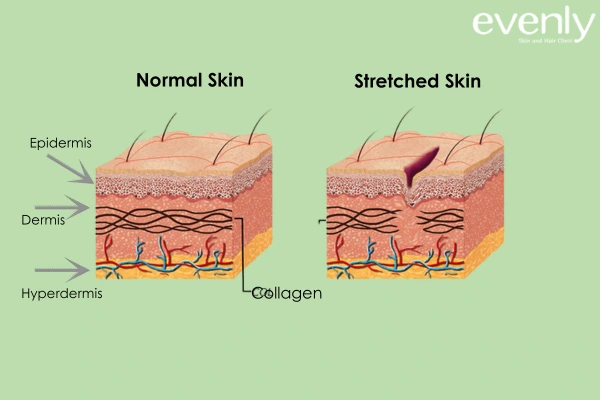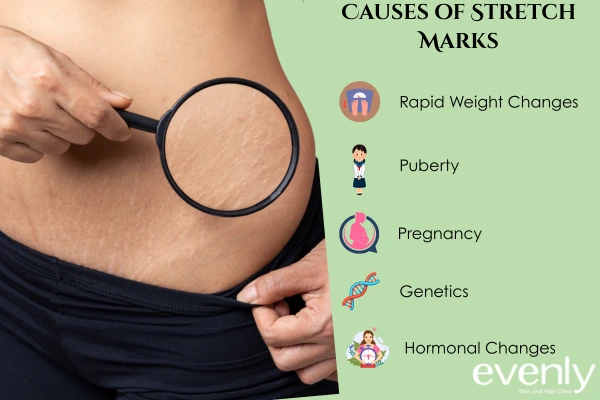Up to 25% OFF on Selected Treatments
-
Treatments
Acne and Scar
Pigmentation
Laser Hair Reduction
Dermato-surgery
Body
Anti Aging
Skin Rejuvenation
Others
- Clinics
- Blogs
Treatments
Stretch marks, those unpleasant lines that often appear on the buttocks and thighs due to rapid muscle growth, pregnancy, and weight fluctuations, are a common concern for many people, especially women. Studies show that women are more likely to develop stretch marks than men, though both can be affected. These marks may appear as purplish, reddish, or silvery streaks across your skin. They commonly appear on areas like buttocks, thighs, breasts, and abdomen. If you seek an effective treatment solution to get rid of stretch marks on your buttocks, thighs, or abdomen for cosmetic concerns, understanding its causes and what triggers them is essential. While many treatments are available, personalized treatment is required to achieve the best results, so consulting an advanced clinic like Evenly Clinic is vital. At Evenly Clinic, we offer a variety of advanced solutions to help reduce their appearance.

Stretch marks, scientifically known as striae distensae, are a form of skin scarring that occurs when the middle layer of the skin dermis is stretched beyond its elasticity. This stretching causes the connective fibers in the dermis to break, leading to the formation of visible streaks on the skin. Even though these marks are harmless, they steal your appeal when they appear on visible or sensitive areas like buttocks and thighs.
Stretch marks on the buttocks or thighs are caused by various factors. Listed below are some of the triggers that cause stretch marks:

Dealing with stretch marks can be frustrating, but there are several treatments available that can reduce their appearance and, in some cases, eliminate them altogether. At Evenly Skin and Hair Clinic, we offer a variety of advanced treatments tailored to address stretch marks. Let’s explore some of the most effective options prescribed by our dermatologists.
One of the most advanced solutions for stretch marks is fractional CO2 laser. This treatment uses fractional laser technology to stimulate the production of collagen and elastin in the skin. The laser works by creating microscopic injuries in the skin, which triggers the body’s natural healing response. Over time, the treated areas become smoother and more even. It’s particularly effective for stretch marks on the buttocks and thighs.
For the enhanced results, our dermatologists may combine CO2 laser treatment with PRP. While the laser resurfaces the skin and promotes collagen growth, PRP accelerates healing and enhances the rejuvenation process. This combined approach not only fades stretch marks on the buttocks and thighs but also improves overall skin quality, leaving it firmer and more elastic.
Microneedling, also known as collagen induction treatment, is another effective treatment for stretch marks on the buttocks. Using a specialised device, tiny needles create controlled micro-injuries on the skin, encouraging new collagen and elastin formation. By combining it with platelet-rich plasma (PRP), which is rich in growth factors from your own blood, the skin’s natural healing process is accelerated. This combination is especially effective in fading newer stretch marks and improving the overall texture of the skin.
Must Read: What is Microneedling with PRP and how it benefits your skin?
For deeper and more stubborn stretch marks on the inner thighs and buttocks, microneedling radiofrequency (MNRF) offers a more intense treatment. This procedure combines microneedling with radiofrequency energy to reach deeper skin layers. The RF energy heats the tissue, further promoting collagen remodeling and skin tightening. MNRF is particularly effective for older stretch marks that have developed a more rigid texture.
Another advanced microneedling technique is the dermapen, a specialised device used to create microscopic punctures in the skin. When used in combination with PRP, this treatment can improve the appearance of stretch marks on the buttocks. The PRP helps to enhance the skin’s natural healing abilities, resulting in more noticeable improvements. Sometimes our dermatologists may prescribe a sole treatment like dermapen or PRP based on the depth of the stretchmarks.
Platelet-rich plasma injections involve injecting PRP directly into the skin to promote collagen production. It’s a non-invasive option that can significantly improve the appearance of stretch marks.
While often used for facial rejuvenation, chemical peels can also be effective in treating stretch marks on the buttocks and thighs. Peels containing ingredients like trichloroacetic acid (TCA) or glycolic acid can exfoliate the top layers of the skin, promoting new skin cell growth and reducing the appearance of stretch marks over time. Regular treatments can help to fade the marks and smooth the skin’s texture.
Dermatologists may also recommend topical creams and lotions containing active ingredients that target stretch marks on the buttocks and thighs. One of the most commonly prescribed ingredients is retinoids, a derivative of vitamin A. Retinoids work by stimulating collagen production, which helps improve skin texture and elasticity, thereby reducing the appearance of stretch marks over time.
At Evenly Clinic, your dermatologist will evaluate your skin condition and recommend the most suitable treatment as part of a customised treatment plan to address buttocks stretch marks.
Preventing stretch marks may not be possible, but there are some steps that you can take to minimise the risk:
At Evenly, our dermatologists offer a range of effective and advanced treatments for stretch marks, from fractional CO2 to chemical peel. With our personalised approach, you can achieve your desired smooth skin.
Stretch marks on the buttocks are common, but not permanent. Whether you are dealing with fresh marks or older or stubborn marks, there are effective treatments available. Book a consultation with us today and make your skin smooth and stretch-free.
For health-related information, follow us on Instagram!!
Click here for online consultation!!
Do stretch marks itch?
Yes, stretch marks can cause itchiness, especially when they first appear. This is because the skin is stretching, and the tearing of collagen and elastin fibers can irritate.
Why do I have stretch marks on my inner thighs?
Stretch marks on the inner thighs can develop due to weight fluctuations, muscle building, or growth spurts during puberty. Both men and women can be affected by them.
Can losing weight make stretch marks worse?
Rapid weight loss can sometimes make stretch marks more noticeable, especially if the skin has already been stretched significantly during weight gain.
Does weightlifting cause stretch marks?
Yes, rapid muscle gain during weightlifting can stretch the skin, leading to stretch marks, particularly on the buttocks and thighs.
How do red stretch marks differ from white stretch marks on your skin?
Red stretch marks are newer and more responsive to treatments. White stretch marks are older and more challenging to treat.
Can retinol creams help with stretch marks on the buttocks?
Yes, retinol-based creams can improve skin texture and stimulate collagen production, making stretch marks less noticeable.
We hope this information has been helpful. If you have any skin and hair-related questions or would like to discuss personalized solutions, please reach out to us at 7337899030. Our team of experts is dedicated to providing personalized care that meets your unique needs. Take the first step towards a healthier, more confident you by scheduling a consultation with us today. Your journey to vibrant skin and stronger hair begins here.
Book an Appointment
Start your journey to healthy skin and hair today.
Leave a Comment